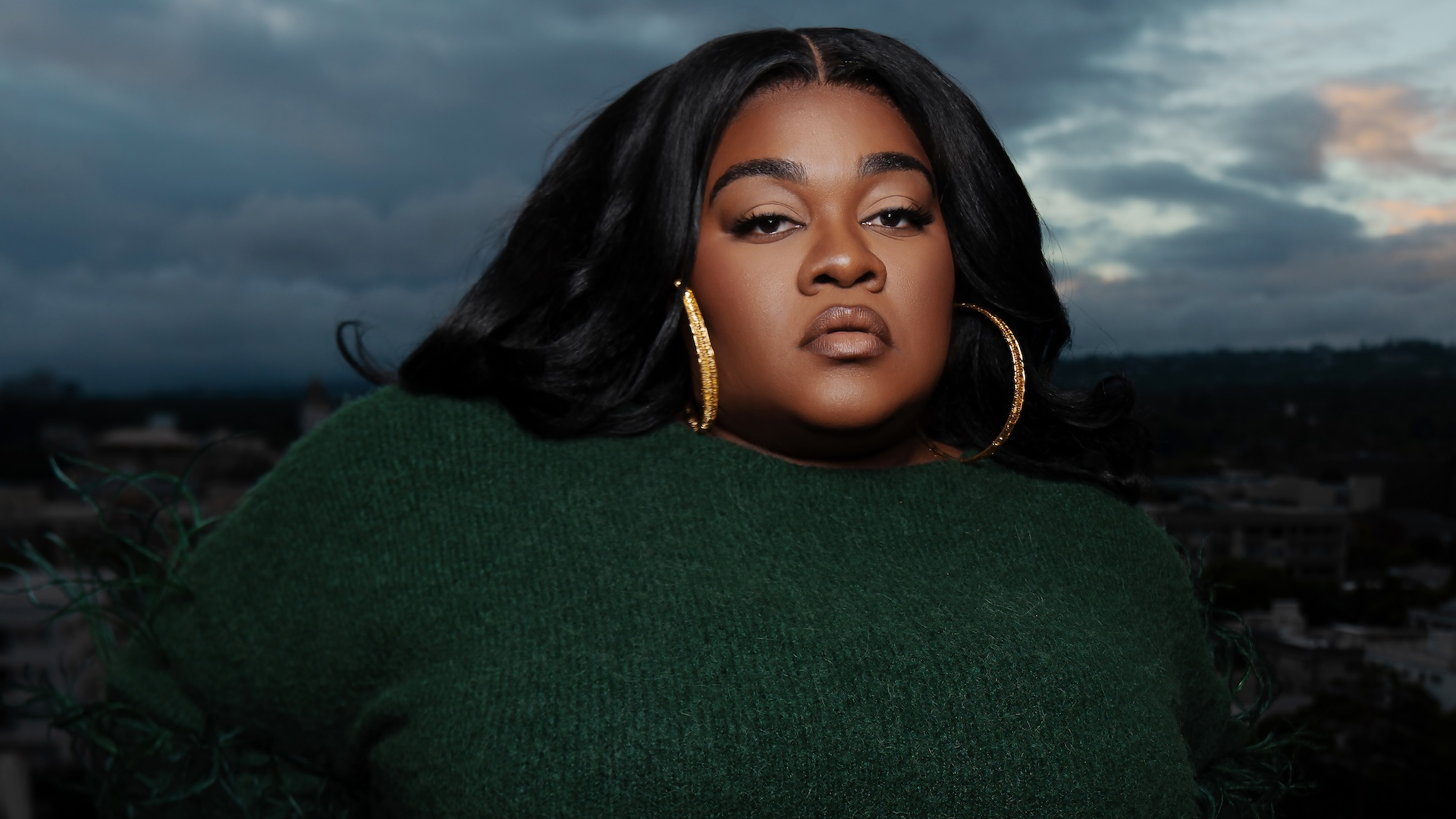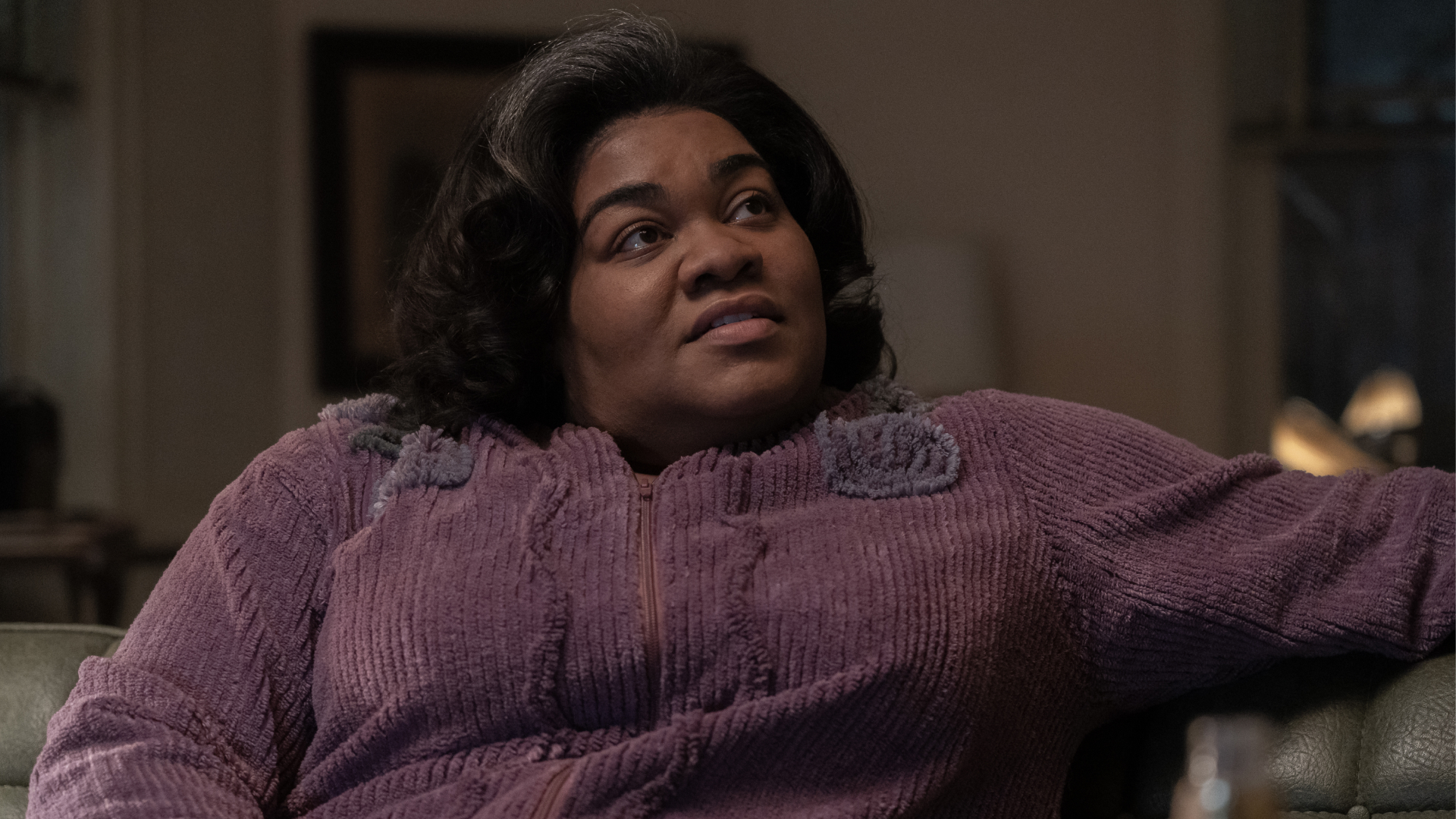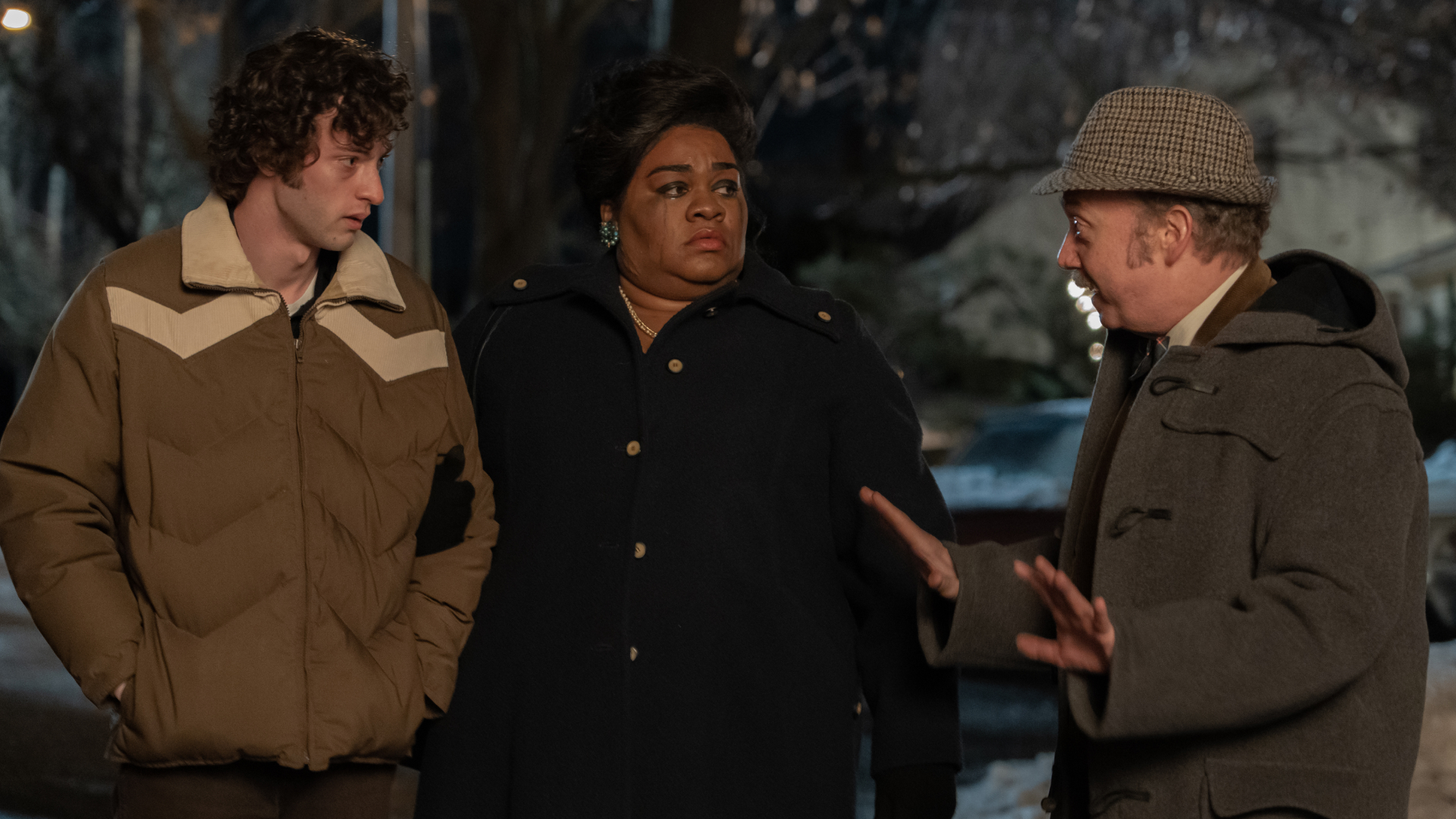
Da’Vine Joy Randolph is finally getting her due this awards season, but fans know she’s been delivering Oscar-caliber performances since her breakout in 2019's Dolemite Is My Name. The Philly native and Yale School of Drama alum started out in theater, earning a Tony nomination for her Broadway debut in Ghost: the Musical. Since then, she's built an impressive roster of scene-stealing roles, which has included projects like High Fidelity, The Idol, Rustin, and Only Murders in the Building. Her latest role, as grieving mother Mary Lamb in Alexander Payne’s heartwarming drama The Holdovers, has already earned her praise from critics’ associations nationwide and catapulted her to the top of the Oscars race.
While describing how she developed the character of Lamb, a cafeteria manager and head cook at a 1970 New England boarding school who’s facing the first holiday season following the death of her son in Vietnam, Randolph makes clear why she deserves every one of her accolades. The 37-year-old actress is meticulous about her craft, from choosing unique roles that challenge her to visualizing real-life fashion and beauty inspo for each of her characters. Each answer she gives throughout a wide-ranging interview is generous and ruminative; she isn’t taking any second of the present moment lightly. “I take it as a deep privilege and an honor to do this as a career, and to be doing it at this level, because it's like Russian roulette. It feels like a one in a million chance,” she says. “To be performing at this level, to have this visibility, means the world to me.”
Here, Randolph chats about imbuing Mary Lamb’s arc with a nuanced portrayal of grief, her penchant for mood boards, and the similarities between her character and her own mother.
Marie Claire: I'm curious about your reaction when you read the script and when you first talked to the director about this very weighty role.
Da’Vine Joy Randolph: One of Alexander's superpowers is that he knows how to make very human and normal situations important and of value. He can really zoom in on this average person; I think what's powerful in doing that is then more people can attach and see themselves in it. Ultimately why I do what I do is to allow the story to affect change in people in some way. What I loved about reading the script was that in these unforeseen circumstances, three very different people—multi-generational, multiracial—were able to connect in that timeframe in history. '68, '69, '70, those three years alone were a very challenging time for America. The world was very divided.
I love that Mary is a woman who was true to herself and was true to her feelings. It shows the value they placed on her and her importance; despite what she looks like everyone gives her space to feel. That to me was amazing, because that's rare even now. I love that this woman was truly going through something and was not trying to hide or diminish herself in any way. I also loved the brevity and the humor [in the script] that was geniusly placed in very specific and meticulous areas. 'Cause that's life, right? Sometimes in a weird way, grief can be funny. Grief has so many levels, so I tried to demonstrate all of those levels, from the start of the movie until the end.

I wanted to show how someone could be going through a horrifying experience, and yet, due to the capacity of their heart, they can still be there for others. At the end of the day, Mary is a born nurturer. She cares about people and their wellbeing, and I feel like food and being a caregiver is one of her ways in which she does it. I just found it so moving that she is able to listen to Paul [Hunham, portrayed by Paul Giamatti] and give him an audience. In many senses he's like the big boy of the group of boys, so he needs attention. It's beautiful how these three broken people can come together and, in a very interesting way, they can fill in the gap for one another, where probably a whole person couldn't or be too much or standoffish. Because they're broken, they know how to reach each other. And I just found that amazing and so beautiful.
I think of the kitchen scene during the Christmas party, where Mary finally breaks down. That release is not often shown on screen for Black women. We’re always the strong ones, the ones who have to pick other people up. So I was so happy to see that scene.
DJR: Alexander and I were trying to figure out throughout the movie: If Mary has the release, where will it be? She has little releases along the way, but there was that perfect storm with a Christmas party, the anxiety of being around strangers, the anxiety of forcing herself to be in a social situation when probably all she wants to do is curl up in a ball. And the song is being played that is reminiscent of her son. She's drunk. And we then discussed, 'How much does she let out? Does she fully go into it?' I think sometimes in life too, sometimes we get the fear of feeling like, If I really let this out, it'll never get closed back up. So it's really beautiful how she just lets it out and then she's like, All right, back to our regularly scheduled program. I like where that landed, because there's something so authentic and relatable to that.
I have to really applaud Alexander because though he is a white man, he—in a way that I haven't had in a while, or not to that degree—was very invested in the authenticity of what needed to occur in Mary. He was very open to a consistent collaboration and conversations of what that entails. He would be like, ‘This is kind of what I envision. Does that track, culturally, as a woman? Does that feel right? Does that feel real?’ I just really applaud someone who is that lauded and that decorated a director to remove the ego and really just be in service of the project and the character.
It's a form of healing therapy, both for the viewer and for myself.
When you were building the character, what were the experiences or influences that helped you form her?
DJR: In my family, it's a very female-forward or matriarch-driven dynamic. A lot of strong women. A lot of what we now consider entrepreneurs before there was a name for entrepreneurs. I'm used to family members—aunts, mother, grandmother—[having] multiple jobs, being the breadwinner, running things. My mother, for sure, is similar to Mary Lamb. When they're talking about how [Mary] worked her whole life so that her son could go to the right schools and she still didn't have enough money for him to go to college. My mother is a teacher, and she worked tirelessly in the public school system, working the afterschool programs and the like, so that I could go to private schools my entire educational career. I went to college at Temple University, and I was on scholarship, but the remainder my mother put in her name so she has debt because of me. So I'm very aware and familiar with that dynamic, and what it's like when someone is making many different sacrifices in order to afford something better for you.
Tell me about how fashion plays a role in building your characters.
DJR: I'm very visual. So even for red carpets, I'll create mood boards. I love a good shared photo album and to tag everyone and be like, 'look, look, look,' for hair, makeup, and clothes. I will take from history—known people in the world but also in my personal life. I will take the essence of them and insert them into the character. High Fidelity has heavy Missy Elliot moments, right? On the Come Up, which I did with Sanaa Lathan, has heavy Da Brat moments. With Holdovers, it has Weezy and her sister Maxine in The Jeffersons. In the first season of The Jeffersons, the whole theme song is ‘Moving on Up,’ so at first Weezy is still dressing like her old life. So she had this really sweet, endearing, soft bun and it had these little tendrils. I always thought it was so cute and feminine but very pulled together. And my grandma used to have a little bun like that. For the glasses, I asked my mom to send me a picture of my grandmother. I showed [the picture] to the props guy and asked if they could find a replica. So the glasses and the little delicate chain, that's my grandmother. Or when Mary goes to the party house, she has that flip and it goes up into that high kind of bun. That's off of an album cover of Phyllis Hyman. It's tons of stuff that I'm constantly sourcing and paying homage to, almost like little subliminal messages and love letters to these women who have forged a path for me.

The roles you've played so far have been so varied and just so fun to watch. What do you look for in a role that makes you want to audition for it?
DJR: When I began as a young artist, I understood one thing very quickly: What you want and what you're looking for, there's no one who has done it in the way that you want to do it. This has nothing to do with how I look. I'm talking about the craft and the artistry and the types of things I want to go for. So I quickly understood, You have to be the blueprint for yourself. Even now I'm learning as I go and going off of a gut feeling. After a director's meeting, if I feel like, mmmm..., then I won't do it, because doing this matters to me so much, and it's a privilege. Nothing's frivolous to me. Outside of that, I then like to just go the complete opposite. I realized of the people that I admire, their throughline is range, and being able to transform. For example, I was filming Rustin playing Mahalia Jackson when I got the call for On the Come Up. It literally can't be more varied. So that's when I get excited, and then I'm like, ‘Okay, let me read the script.’
Also, to me, this is a marathon, so I don't want to be bored by my own self. I don't want people to be like, ‘Okay, Da'Vine's in the movie? We know [what it will be like].’ No, no, no, no, no. I wanna keep it exciting for you guys, and I want it to be equally as enjoyable for you. I don't ever want this job to turn into me feeling like it's a nine-to-five. Then lastly, I would say it's important for me to play people of all walks of life. But whether they're villainous or not, rich or poor, there has to be a redeeming quality and a change that incurs in them. So they have to start somewhere, have a moment, go through some things, and end in a different, better place.
Quality is a big part of it, because it's important. People are watching this. It's not gonna just go away. So even if I'm doing a fun comedy, I want to inspire people. On season three of Only Murders, it was a new PA and they were walking me to set. They became emotional and were telling me how grateful they were to me for depicting a queer woman where it wasn't about her being queer; she was just allowed to be. And I was like, Wow. I'm thinking, I'm just here having fun and playing games with Martin Short, Steve Martin, and Selena Gomez. And it's like, No, this stuff matters. So I just try to put respect on all of my characters because it matters to people. That's why I do this: so that people can see themselves, feel heard, feel seen. They can connect to something, work through something, move past something, reconnect to something. It's a form of healing therapy, both for the viewer and for myself. I don't ever do something just to do it.
This interview has been edited and condensed for clarity.







